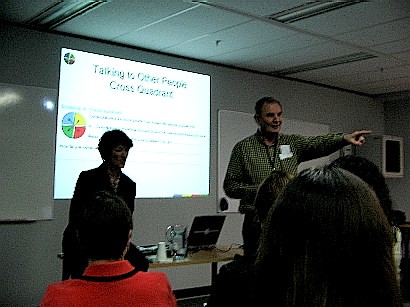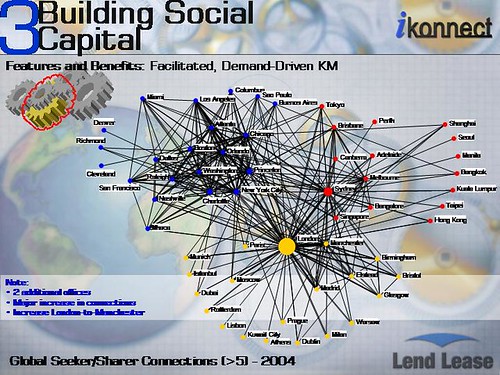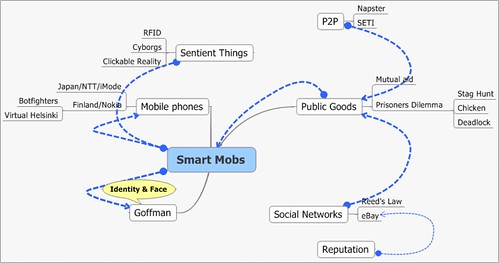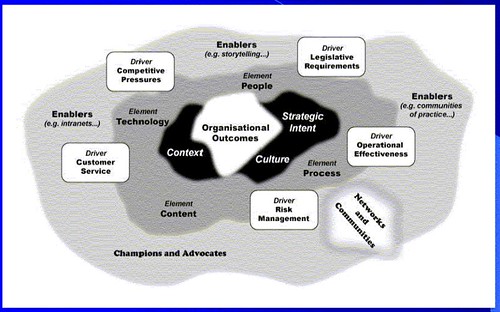Some people might find this movie very annoying.
But it has a fascinating sub-plot about the use of personal narrative. One character has a story he tells over and over again - that takes them up the corporate ladder. The story is a tool for the character to gain respect and power. At one point in the film however, the story is taken apart. Not shown to be fake or a lie (necessarily). But its purpose is exposed and discussed. And then the story loses its power.
1. It's a truism that explaining a joke kills it. To what extent does explaining a story kill it? And how is this connected to power? Those in charge have the power to dismiss/deconstruct/demolish the stories of those beneath them. Subordinates do not have a reciprocal platform for story dissection.
2. Some stories are not closely associated with the teller - stories with common ownership such as fairy stories and folk parables are examples of these. At the other extreme are biographical stories. These stories are more precious to us. If we hear someone else telling those then we may get angry - something is being stolen. Or if they are attacked/discounted we respond defensively.
Monday, October 31, 2005
Scientific Research Proves Bloggers Evil
The latest from Forbes.
Some of this article deals with justified fears around the limits of both freedom of speech & legal methods for its control in an online environment. And some of it is right. The rest appears to be an example of the unbalanced invective it attacks.
Web logs are the prized platform of an online lynch mob spouting liberty but spewing lies, libel and invective.
Mwahahahahaha!!!!
*Twirls ends of waxed moustache*
Some of this article deals with justified fears around the limits of both freedom of speech & legal methods for its control in an online environment. And some of it is right. The rest appears to be an example of the unbalanced invective it attacks.
Web logs are the prized platform of an online lynch mob spouting liberty but spewing lies, libel and invective.
Mwahahahahaha!!!!
*Twirls ends of waxed moustache*
Sunday, October 23, 2005
Brainstorming Software
Meet Eliza.
Isn't she helpful. And kinda annoying?
Originally built to pass the Turing Test, Eliza is suggestive of an untapped opportunity - one-person brainstorming.
This may sound a bit onanistic - but think about it. You want someone to bounce ideas off but everyone else is off playing Doom. What do you do? Well, you probably want something like Eliza - but with an added randomizer - e.g.
"So what do I do about the limited bandwidth of the application?"
"Do you like pickled mangoes?"
Or something...
Isn't she helpful. And kinda annoying?
Originally built to pass the Turing Test, Eliza is suggestive of an untapped opportunity - one-person brainstorming.
This may sound a bit onanistic - but think about it. You want someone to bounce ideas off but everyone else is off playing Doom. What do you do? Well, you probably want something like Eliza - but with an added randomizer - e.g.
"So what do I do about the limited bandwidth of the application?"
"Do you like pickled mangoes?"
Or something...
What do you do when you meet someone famous?
So I was at the theatre on Saturday night and after the show I visit the bathroom. And the sink is William H Macy. What do I do? Do I say: "Hello. I am a fan of your understated yet acutely observed performances?"
Do I act like a smart ass? "You were great in Fargo but I prefer Reservoir Dogs, Mr Buscemi".
Do I ask him to sign some paper towel with some soap?
Well I do none of these things. It's a Saturday night and he's just seeing a show with some friends. So I just wash and dry my hands.
He coughed a couple of times though.
Do I act like a smart ass? "You were great in Fargo but I prefer Reservoir Dogs, Mr Buscemi".
Do I ask him to sign some paper towel with some soap?
Well I do none of these things. It's a Saturday night and he's just seeing a show with some friends. So I just wash and dry my hands.
He coughed a couple of times though.
Tuesday, October 18, 2005
ISPI
Last night's ISPI session looked at whole brain thinking & the Herrmann model. There's an obvious use for this in starting conversations around diversity & thinking styles for teams.


Hello Laziness
Hello Laziness is the French Dilbert - i.e. more erudite, epicurean and cruel. It mercilessly scewers what passes for corporate culture and management wisdom. Some of its examples are particularly French but everyone will recognise something from it in their working lives. The back cover suggests that the author was almost fired for writing it. So there you go - if you want to slag off your employeers, better make it a best seller.
I especially enjoyed the application of Lacan to work archetypes (just as I enjoyed the Team America view of international relations).
I especially enjoyed the application of Lacan to work archetypes (just as I enjoyed the Team America view of international relations).
Great Tippers Make Great Lovers
So by his own definitions, is Malcolm Gladwell a Connector, a Maven or a Salesman?
Connector? Well, he certainly seems to have talked to a few people in writing the Tipping Point. But writing can be a lonely job and it's hard to gauge his connection levels. Is he a Maven? As noted below, MG is not necessarily a great thinker or even an "expert" - his arguments are generally suggestive rather than rigorous and he leaves an impression of playing fast and loose with academic data. But Salesman? Oh yes. He uses everyday examples (e.g. teen smoking, Seasame Street) and simple, jargon-free language. He makes direct emtional appeals for a better world. He plays to the crowd and we love it.
Connector? Well, he certainly seems to have talked to a few people in writing the Tipping Point. But writing can be a lonely job and it's hard to gauge his connection levels. Is he a Maven? As noted below, MG is not necessarily a great thinker or even an "expert" - his arguments are generally suggestive rather than rigorous and he leaves an impression of playing fast and loose with academic data. But Salesman? Oh yes. He uses everyday examples (e.g. teen smoking, Seasame Street) and simple, jargon-free language. He makes direct emtional appeals for a better world. He plays to the crowd and we love it.
Saturday, October 15, 2005
Think with the whole your brain
I'll be at ISPI on Tuesday.
I will try to be thinking with my whole brain but I can't make any guarantees.
I will try to be thinking with my whole brain but I can't make any guarantees.
SOLA Games Workshop
You are cordially invited to an evening of game-playing and discussion. We hope that we will all find out more about: leadership, communication, power and language. But we can’t guarantee that we will – after all, it has yet to happened. Participation is free but we would like you to bring the name of a game we could play at a future event.
SoLA - Games Workshop – Thursday 27th October – 5.30pm to 7pm
Venue UTS – Building 10 Level 5 room 580.
Drop a line to our generous host if you wish to attend.
SoLA - Games Workshop – Thursday 27th October – 5.30pm to 7pm
Venue UTS – Building 10 Level 5 room 580.
Drop a line to our generous host if you wish to attend.
Monday, October 10, 2005
Last Thursday's NSW KM Forum
Last Thursday, Marcus Gibson gave a great presentation on the ikonnect programme at Lend Lease. This diagram indicates the interpersonal connectivity that ikonnect has achieved.
Lauren Allen from HLA Envirosciences & the Weblogics crew also came up with the goods on the implementation of Extralogic software to support communities of practice development.


Lauren Allen from HLA Envirosciences & the Weblogics crew also came up with the goods on the implementation of Extralogic software to support communities of practice development.


Smart Mobs
Smart Mobs by Howard Rheingold is an entry-user look at mobile/pervasive/ubiquitous computing. I was tempted to review it but thought I'd just show you my mind map (created using a trial version of MindManager) instead.


Sunday, October 09, 2005
The Map Is Not The Territory
I have seen quite a lot of KM technology maps - of differing levels of detail & complexity.
Why do we need a KM technology map? Well, the obvious answer is that there's a lot of tech out there. Some of which claims to be KM-related and some of which is used in KM initiatives (N.B. these sets overlap but are not identical). So how do we make sense of this morass of software? With a map that tells you - this piece of software is good for this thing. Simple.
Now, there are some risks involved in doing this. Here are some that come to mind:
1. Any map represents a particular construct of KM. And such contructs should be specific to certain organisations and certain contexts. You actually need to map the tech against local models of how KM operates. A generic map may be a trap.
2. The tech itself is changing dynamically so the map is always out of date.
3. The tech in a particular area may not work with a specific group depending on context. E.g. I am doing a project with some telesales people at the moment and these people have been selected for their conversational ability and relationship-building skills - but not necessarily their reading comprehension. So visual eLearning without a verbal, interactive component is unsatisfying for these people.
I think the construction of the map is the interesting thing for most organisations, not necessarily the output.
Why do we need a KM technology map? Well, the obvious answer is that there's a lot of tech out there. Some of which claims to be KM-related and some of which is used in KM initiatives (N.B. these sets overlap but are not identical). So how do we make sense of this morass of software? With a map that tells you - this piece of software is good for this thing. Simple.
Now, there are some risks involved in doing this. Here are some that come to mind:
1. Any map represents a particular construct of KM. And such contructs should be specific to certain organisations and certain contexts. You actually need to map the tech against local models of how KM operates. A generic map may be a trap.
2. The tech itself is changing dynamically so the map is always out of date.
3. The tech in a particular area may not work with a specific group depending on context. E.g. I am doing a project with some telesales people at the moment and these people have been selected for their conversational ability and relationship-building skills - but not necessarily their reading comprehension. So visual eLearning without a verbal, interactive component is unsatisfying for these people.
I think the construction of the map is the interesting thing for most organisations, not necessarily the output.
Long Vs. Short Decisions
Someone gave me a link to this article.
Which is an interesting companion piece to the Gary Klein / Malcolm Gladwell stuff.
Some decisions have to be made quickly. Those individuals that Klein was examining typically had to make life-or-death decisions in short time-frames. Consultation was not an option. And often this decisions only affected a very small number of people (e.g. a firecrew or a sick baby).
In comparision, some decisions have much longer timeframes and may involve more people - which are the decisions that appear in the Ivey journal.
Neither approach (intuitive, quick, "short" vs. consultative, "long") is wrong but each is appropriate for different enviornments.
An issue arises in that managers often develop great "short" skils in high-pressure, team-based environments. They are then promoted and take these behaviours to environments that require "long" skills (e.g. consultation, openness) without recognising that the context for their decision-making has changed. And ego is a factor here.
Which is an interesting companion piece to the Gary Klein / Malcolm Gladwell stuff.
Some decisions have to be made quickly. Those individuals that Klein was examining typically had to make life-or-death decisions in short time-frames. Consultation was not an option. And often this decisions only affected a very small number of people (e.g. a firecrew or a sick baby).
In comparision, some decisions have much longer timeframes and may involve more people - which are the decisions that appear in the Ivey journal.
Neither approach (intuitive, quick, "short" vs. consultative, "long") is wrong but each is appropriate for different enviornments.
An issue arises in that managers often develop great "short" skils in high-pressure, team-based environments. They are then promoted and take these behaviours to environments that require "long" skills (e.g. consultation, openness) without recognising that the context for their decision-making has changed. And ego is a factor here.
Monday, October 03, 2005
Subscribe to:
Posts (Atom)



